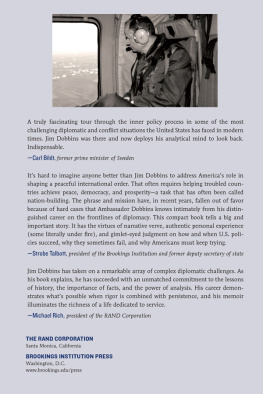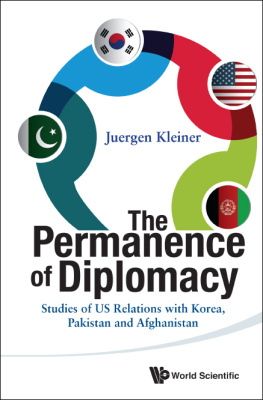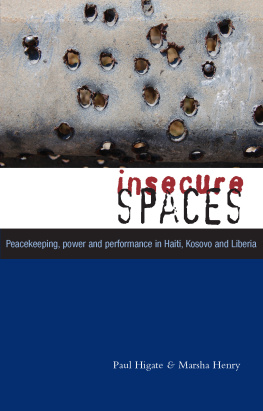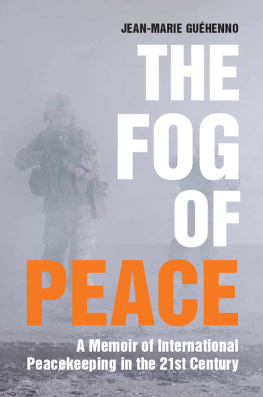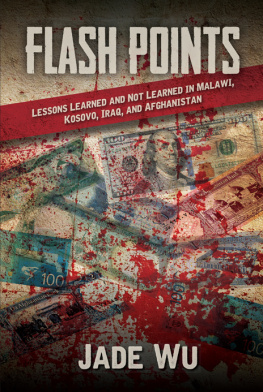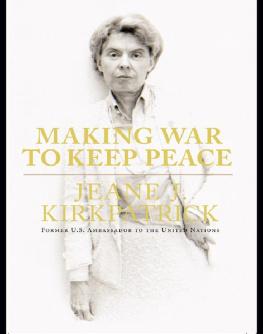FOREIGN SERVICE
Five Decades on the Frontlines of American Diplomacy

JAMES F. DOBBINS
THE RAND CORPORATION
Santa Monica, California
BROOKINGS INSTITUTION PRESS
Washington, D.C.
Copyright 2017
THE BROOKINGS INSTITUTION
1775 Massachusetts Avenue, N.W., Washington, D.C. 20036
www.brookings.edu
All rights reserved. No part of this publication may be reproduced or transmitted in any form or by any means without permission in writing from the Brookings Institution Press.
Foreign Service is a copublication of the Brookings Institution Press and the RAND Corporation.
THE BROOKINGS INSTITUTION is a private nonprofit organization devoted to research, education, and publication on important issues of domestic and foreign policy. Its principal purpose is to bring the highest quality independent research and analysis to bear on current and emerging policy problems. Interpretations or conclusions in Brookings publications should be understood to be solely those of the authors.
THE RAND CORPORATION is a research organization that develops solutions to public policy challenges to help make communities throughout the world safer and more secure, healthier and more prosperous. RAND is nonprofit, nonpartisan, and committed to the public interest.
RAND Corporation, 1776 Main Street, Santa Monica, CA 90401-3208
Tel.: 310-393-0411; Fax: 310-393-4818; www.rand.org
Library of Congress Cataloging-in-Publication data are available.
ISBN 978-0-8157-3004-0 (cloth : alk. paper)
ISBN 978-0-8157-3020-0 (ebook)
9 8 7 6 5 4 3 2 1
Typeset in Granjon
Composition by Westchester Publishing Services
Contents
ROBERT B. ZOELLICK
Foreword
ROBERT B. ZOELLICK
JIM DOBBINSS MEMOIR IS THE story of an exemplary Foreign Service officer during an extraordinary time.
Jims tenure spanned ten presidents and thirteen secretaries of state. He showed up for work at the State Department in 1967; he closed the door on his diplomatic service, after being recalled to duty, in 2014. The half-century in which Jim worked as an American envoy encompassed an incredible range of events, and Jim was a witness or deeply involved in many of them. Those five decades also comprised major transformations for the United States, at home and abroad.
Jims earliest experiences signaled the possibility of a career on Americas international frontiers. He spent his early teenage years in the Philippines, where his father worked for the Veterans Administration. After graduation from Georgetown Universitys School of Foreign Service, Jim was commissioned in the U.S. Navy, where his duty station aboard the aircraft carrier Bon Homme Richard in the Tonkin Gulf in 1965 enabled him to listen to garbled messages of patrol boat attacks that helped lead to Americas long trial of battle in Vietnam.
This memoir is a diplomatic version of John Keegans landmark Face of Battle (1976), an account of warriors struggles in the vanguard, not of generals studying maps at headquarters. This story is that of an individual soldier of diplomacy, a recounting of the tactics and operations on the frontlines of foreign policy. And there is no doubt that as a fresh FSO, Dobbins skirmished over unusual terrain; at his first posting in Paris, as third secretary, Jim not only supported the frustrating Paris Peace Talks on Vietnam, but also wandered the tumultuous streets of Paris in 1968 as Ambassador Sargent Shrivers Special Assistant for Youth Affairs.
Jims assessment of his role in the Foreign Service is too modest. In my experience, most U.S. Foreign Service officers were one of three types. There were Americans who enjoyed living abroad to encounter different people, cultures, languages, and perspectives. Other FSOs viewed themselves as analysts and foreign reporters, seeking opportunities to understand other governments and then to communicate back to audiences of compatriots in Washington, and, on occasion, to top officials. Then there was a relatively small caste of which Jim was a premier member: These FSOs wanted to make U.S. policy. An FSO seeking a policy career must, of course, serve abroad, but will be drawn to privileged assignments with senior officials, often presidential appointments on the storied Seventh Floor of the State Department. If fortunate, the FSO might develop a reputation as a valuable contributor in shaping or executing policy. With experience, a reputation might grow within the Foreign Service, but also with those people of both parties who work closely with presidents, secretaries of state and defense, and national security advisers. Yet a career officers association with political appointees runs risks, too.
One of the State Departments great ironies is that its Foreign Serviceso schooled in understanding the complexities and even foibles of other countries political systemsrecognizes only the most basic processes, personalities, and prerogatives of the U.S. Congress. Given congressional and political jabs about the striped pants set at the State Department, one can understand the wariness of most Foreign Service officers to adapt to Congresss ways; unfortunately, that distance can lead to conflicts that interfere with policies and careers. Jim encountered this problem, too.
Beyond the first three types of officers, the U.S. Foreign Service now includes a fourth group, and Jims book explains the events that defined the experience of this cohort. Over the past decade or so, many FSOs have been posted to states in conflict or societies struggling to recover, where on-the-ground duties involve more reconstructing than reporting. As Jim points out, many FSOs now find themselves in countries with no effective government and thus little opportunity for normal diplomatic discourse. Even more difficult than shaping the behavior of foreign states is influencing the development of other societies. Ironically, these assignments recall the early service of some of Jims peers who were posted to Vietnam.
Jims role as a policymakerand as a senior U.S. representative in societies in conflictis worth special note. One of his bosses and friends, Rick Burt, and I recently compared our experience of working with Jim. We agreed that when Jim helped solve problems, he offered breadth and insight by analyzing and presenting issues within the context of history and wider considerations. A discussion with Jim was also seasoned with his sharp wit. Moreover, Jim Dobbins was always willing to explain his case patiently and was never afraid to push back; even if he could not change minds, he would fulfill his tasks with all his skill and tenacity. In addition, unlike some senior FSOs, Jim was not partisan or political and avoided being branded as a Republican or Democrat; he thrived under administrations of both parties and was a consummate professional. Finally, Jim always believed the United States could make a difference, perhaps even stretching that influence at times and in places where others might make different but equally well-reasoned calculations. I hope this book will help make Jims service a model for future Foreign Service professionalism, not serve as a reminder of a vanishing breed.
During the first half of Jims career, his friends would joke that he could only be posted to countries where one could drink the water. We knew of Jims skill in the Cold War world of transatlantic diplomacy during the long East-West struggle. His natural State Department home was the well-established, buttoned-down European Bureau, or perhaps the smaller, intellectually sharp Bureau of Politico-Military Affairs. But then Jim underwent a conversion to the messy labors of security, power sharing, reconstruction, humanitarian support, and development in broken countries struggling through conflicts. Ambassador Dobbins became the go-to guy for the new diplomacy of nation-buildingin Afghanistan, the Balkans, Haiti, and Somalia. Thats a tour one will find only in guidebooks for the extremely intrepid! Therefore, Jims memoir also identifies a major shift in U.S. foreign policy priorities and experience.
Next page
